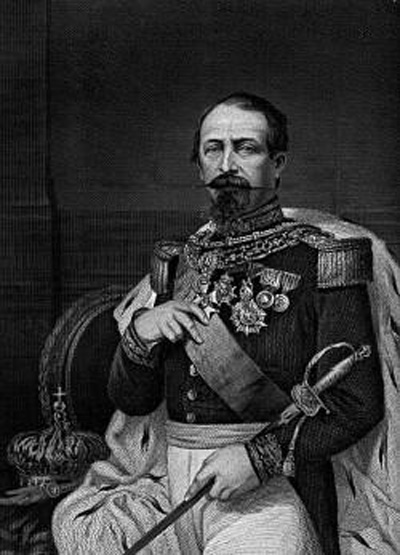Napoleon III
By all accounts he preferred pretty girls to pictures, but if he had to have pictures too, he liked pictures of pretty girls. Nor was he adverse to portraits of himsclf or Napoleon I, depictions of imperial victories, nor, for that matter, to anything anyone else of importance liked; it wasn't worth splitting hairs over questions of taste. Maximc DuCamp's account of Napoleon's visit to the Salon [the annual arti exhibition at which officially recognized works were displayed] of 1853 gives the flavor of the Emperor's taste:
"I was at the Salon the day belore it opened. I had met Morny who was President of the Jury [i.e. the group that decided which paintings and sculptures would be admitted to the Salon] and we were talking together when someone announced that the Emperorwas coming. I started to leave when Morny said 'Stay, come along with us, you'll hear some good observations.' Napoleon III, escorted by several officers, government officials, and all the members of the Jury, was walking quickly through the galleries without uttering a word, without making an observation, passing before the best works with an indifference he didn't even try to hide. It was obvious that he was carrying out one of the thousand tasks that his role as sovereign demanded of him. He arrived at the last gallery, crammed with mediocre works which seemed to have been accepted only to cover the nudity of the walls. He stopped suddenly before a picture representing Mont-Blanc. It was pitiful and gave the impression of a group of sugar loaves of various sizes. For a long time he stood motionless, contemplating this daub, then, turning tovvards Morny on his left. he said: 'The painter ought to have indicated the relative heights.' After this "good observation" he resumed his task and went on his way."
DuCamp ended by characterizing the taste of Napoleon III thus: "Painting, a closed book; music, a dead letter: poetry, incomprehensible.''3 Apologists for Napoleon III point out that his background was military, his youth occupied with insurrections, exile, and imprisonment, leaving little time for the pursuit of culture. Coldly received by artists at the 1849 Salon and lacking confidence in his own taste, he fell back (publicly) on that of his predecessors and (privately) on whatever was pleasant and undemanding.

Louis Napoleon (Napoleon III)